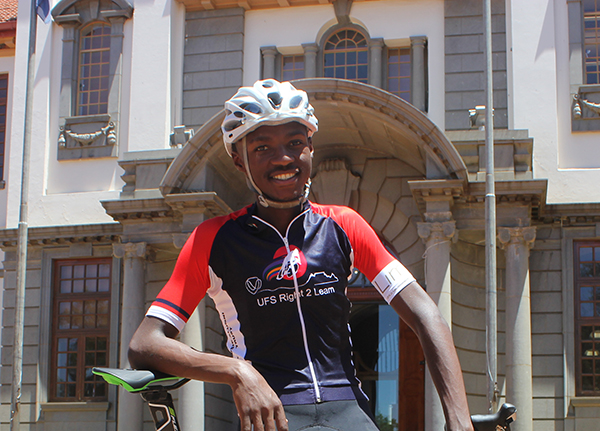Latest News Archive
Please select Category, Year, and then Month to display items
06 April 2018
Photo Rulanzen Martin
 From the left: Dr Thulisile Mphambukeli, leader of the BRICS research team that is exploring the political economy of water and food security, and her research partner, Dr Victor Okorie.
From the left: Dr Thulisile Mphambukeli, leader of the BRICS research team that is exploring the political economy of water and food security, and her research partner, Dr Victor Okorie.
A Brazil, Russia, India, China and South Africa (BRICS) delegation is to hold the 10th Annual BRICS Summit in the last week of May 2018 in Johannesburg. Dr Thulisile Mphambukeli, leader of the University of the Free State (UFS) research team alongside Dr Victor Okorie from the Department of Urban and Regional Planning, in collaboration with Prof Lere Amusan of North-West University, will ensure that water and food security is a prominent feature on the gathering’s agenda.
First, the project titled: “Exploring the political economy of water and food security nexus in BRICS and Africa” will debut at the National Institute for the Humanities and Social Sciences BRICS Think Tank Forum”.
According to Dr Mphambukeli, the key to water security is attitudinal change by means of education and conscientisation. This, she is adamant about, holds the potential to drive behavioural adjustments in the way society interacts with water.
Genetic and social approaches
Dr Okorie asserts that if strides towards reducing the demand for water were to be made, research efforts should be geared towards effecting changes at DNA level. Meaning we need to explore waterwise ways that enable crops and animals to thrive optimally.
The project also looks at social dimensions of water such as flushing a toilet. “Research activities on redesigning toilets, especially the urinal, where more than nine litres of water are used to flush less than one cubic centimetre of urine, are timely in the context of managing water and the food nexus crises,” said Dr Okorie.
Combining the genetic and social approaches would allow us to produce more with a smaller water footprint. This can be made possible by implementing precision agriculture which is about estimating and applying exact quantities of water and nutrients needed for the production of crops or the raising of livestock.
Paradigm shifting policies
Prof Amusan said the team intended to propose functional solutions that take the quality of water into consideration. Equitable production and distribution of water depends on endorsing policies of co-production between citizens, governments and the public sector. BRICS member states mutually consider water and food security as an issue of paramount significance, hence its feature on this prestigious summit’s agenda.
Kovsies SRC President cycles to raise money for registration
2017-11-27

Asive Dlanjwa, Bloemfontein SRC President, will cycle to Cape Town to
raise money for the 2018 registrations.
Photo: Moeketsi Mogotsi
“When I came to the University of the Free State (UFS), all I had was a R50 note and I did not know how I was going to register.” This is what Bloemfontein Campus SRC President, Asive Dlanjwa, encountered when he arrived at the UFS. He says the biggest struggle for students is not having finances for registration at the beginning of the year.
R2 million to be raised for 2018 registration
It is for this reason that Dlanjwa will be partaking in the Right to Learn Cycle tour challenge from 27 November to 4 December 2017. The Student Representative Council (SRC), in partnership with Institutional Advancement, came up with this initiative to cycle from Bloemfontein to Cape Town in eight days in an effort to raise R2 million for 2018 registration.
Bringing hope to prospective students and their families
Dlanjwa says, “We want to give access to as many students as possible. This initiative is not only about the students, it’s about giving hope to their families and taking them out of poverty.” He recalls an incident where a student went to the SRC offices to seek help at the beginning of the year, with nothing but an identity document and the clothes he had on. The student had been sleeping at the Bloemfontein Tourism Centre because he had no money for accommodation and registration. “These are the types of cases that we have to deal with at the start of each year,” says Dlanjwa.
He urges the community to partner with them in ensuring that many students get access to higher education by donating money through the Give-n-gain page. Dlanjwa, joined by a few more guest cyclists, left Bloemfontein on Monday 27 November 2017 and are expected to arrive in Cape Town on Monday 4 December 2017.